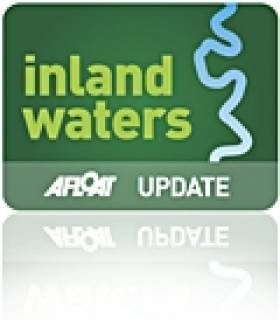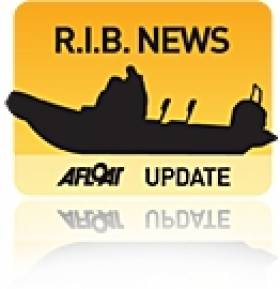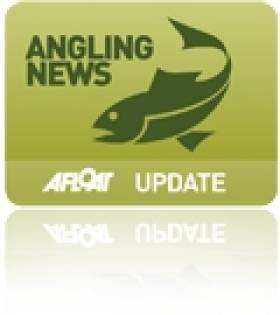Displaying items by tag: angling
Bridge Restored Thanks to Gweebarra Fishing Club
Volunteers from the Gweebarra Fishing Club have completed work on a footbridge across the river near Doochary, the Donegal Democrat reports.
The new bridge is part of a three-year project to develop accessibility on the riverside for walkers and anglers alike. Inland Waterways.
Club chairman Thomas Monds commented: "There’s been nothing there since the flood swept [the old bridge] away years ago. But with the club getting going and more and more local people getting involved, we thought this was a good chance to do something."
He added: "The footbridge makes both banks of the Gweebarra accessible to both anglers and walkers, without having to retrace yours steps."
According to Monds, the new bridge in tandem with recent enhancements in the local fishery infrastructure have helped to make Gweebarra "one of the most accessible and attractive angling venues in the country".
The Donegal Democrat has more on the story HERE.
New Redbay Angling Rib goes on Fish Patrol
People don’t generally associate Ribs with fishing, their perception is that the hooks will puncture the tubes. One man Hamish Currie has disproved this theory, Hamish who runs one of the top charter angling businesses in Ireland has just taken delivery of his new purpose built 10 meter rib.
This new rib replaced his previous 9m rib which Hamish has fished for the past six years. In that time Hamish has customers from all over Europe and has been the top Irish specimen boat for the last five years. Last year Hamish’s rib caught one hundred and thirty nine Irish specimens and the heaviest Irish & British skate at 247lbs.
Having worked his old rib for six years Hamish decided to order a purpose built rib, putting his experience and needs to the team at Red Bay Boats, we came up with what we feel is the ideal charter angling boat.
The first advantage of the rib is that there is no sideways roll as the tubes touch the water at rest this cuts out the sickness that many anglers experience on a rolling hand sided boat. The next advantage is the low horse power required to push the boat. Hamish boat is fitted with a single 285hp Yamaha diesel stern-drive at 18 knots his fuel burn is 20 litres per hours. This gives him a range of 400 miles and at top speed of 28 knots.
So the design spec of the new boat is as follows – 10 meter overall, with a beam of 3.5m, self draining deck complete with twin stern scuppers extra D-fender and cladding, heavy duty tubes with 3 compartments per side. Island wheel house with seating for ten persons and helmsman Fish hold/storage lockers and stern, sealed engine box all with reinforced lids for added fishing space 1m high side deck and rails large bow storage locker with anchor and rope storage in the very bow. Hamish carries 1500ft rope and anchors in 400ft of water so with the bow storage he can haul his anchor from deck level! The wheelhouse features two Seaglaze sliding doors, with a separate toilet on the starboard rear. The off-set forward console houses the Garmin 12’ plotter complete with depth and radar, stern camera, Garmin VHF, 2nd Garmin fish finder and sound system, under console there are storage areas for the various bits of fishing tackle needed to catch large fish, weights, traces etc. In order to get enough walk round space round the wheelhouse Red Bay opted for a D section tube, this enabled us to mould a straight side and deck encasing the tube, the result a full walk around boat with 23.5 meters of fishing space on a 10m boat this is exceptional. Rods are stored above the cabin roof along with the liferaft, boat hook etc. < /br> < /br> < /br> < /br> The Yamaha stern-drive is fitted with twin props for max drive and grip, the leg can be trimmed up for shallow work and ease of launching and recovering. Hamish hauls his rib each day with the aid of a special drive in trailer. Hamish believes his boat to be the best angling boat available, the large fishing space, lack of roll, ease of running, excellent sea keeping range and the fact that the boat can’t sink would indeed all add up to the perfect angling rib.
For more details and photos visit www.redbayboats.com and www.predatorireland.com. If you would like to try Hamish’s boat then send redbay an email.
The boat is coded to mca: Cat 3.
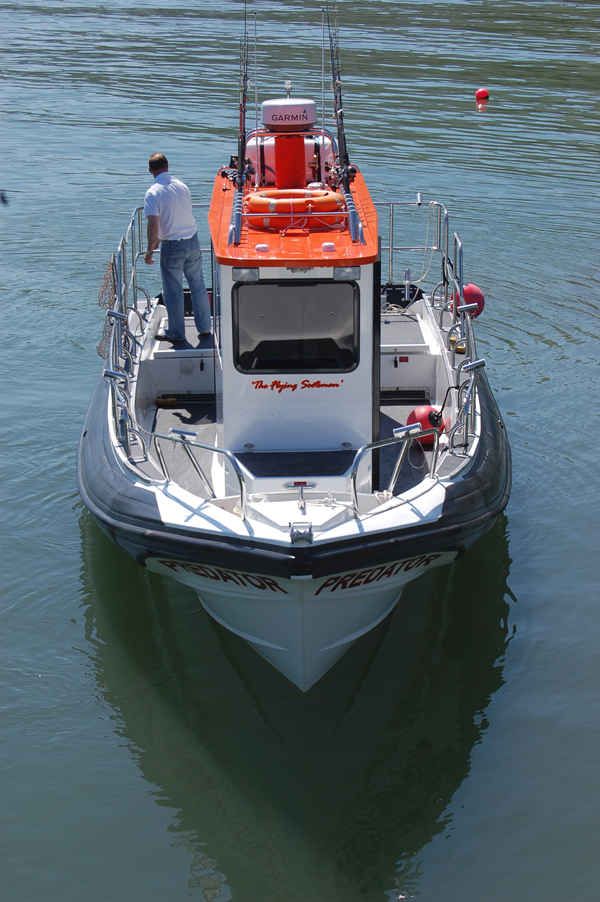
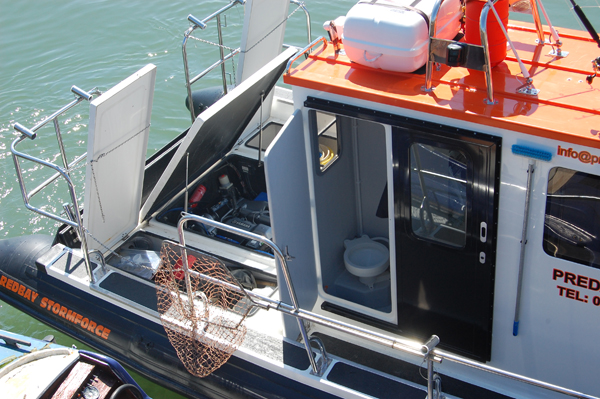
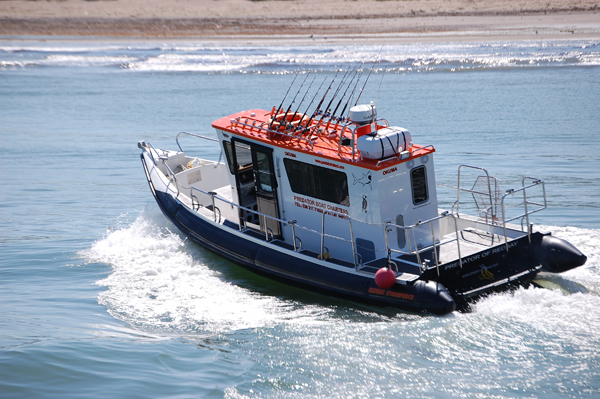
Waterways Ireland Fishing Festival Launched
The Launch of the Waterways Ireland Classic Fishing Festival takes place yesterday Friday 23 April 2010 in advance of the competition which runs from Sunday 25 April to Friday 30 April 2010. This year’s Classic Fishing Festival is the 35th anniversary event, cumulatively hosting over 12,250 anglers. Though it must be said most of them have come year after year, in total they have spent over £17,500,000 in the Lakeland County since 1976.
The 2010 event welcomes competitors at a reception taking place on Sunday 25 April, with the competition begins on Monday 26 April and the Festival closes with a Gala Farewell and Prize Presentation on Friday 30th April.
The Waterways Ireland Classic Fishing Festival is the main event of the Fermanagh match fishing season and attracts up to 250 anglers from Northern Ireland, the Republic of Ireland, Great Britain, Germany, Austria and even further afield.
Over the five days, anglers will compete for prizes worth more than £20,000, with section and daily prizes on offer along with aggregate prizes. The “Classic Competition” takes place on Monday, Wednesday and Friday with the “King of the Erne”, organised by the local Erne Anglers Angling Club, completing the Festival on Tuesday and Thursday.
Among the 250 eager anglers lining up at the Fermanagh Lakeland Forum on Monday morning will be last year’s winner, Andrew Chapman from Ballybay, Co Monaghan. He is to be joined by twelve other previous winners, including Kevin Ashurst, who won the Classic in 1978.
Organised by Fermanagh District Council, with assistance from the Department of Culture, Arts and Leisure, the Festival’s major sponsor for the last seven years has been Waterways Ireland, the navigation authority on the inland waterways of which Lough Erne is one.
Martin Dennany Director of Marketing & Communications Waterways Ireland said’ The Waterways Ireland Classic Fishing Festival is a major joint activity which Waterways Ireland supports in partnership with Fermanagh District Council.
Speaking at the Press Launch for the 2010 Waterways Ireland Classic Fishing Festival, Chairman of Fermanagh District Council, Councillor Robert Irvine stated: “The Classic, now running for thirty five years, is one of our longest established events here in Fermanagh and we are delighted to once again welcome the many anglers who make an annual pilgrimage to our Lakeland County”.
Anglers can apply before the event by contacting Fermanagh District Council, Town Hall, Enniskillen, Co. Fermanagh, BT74 7BA or by calling +44 (0)28 6632 5050.
North West Charter Skippers Association
Enjoy the very best in Sea Angling Charters.



























